160 years ago fell Sevastopol
From the order of the commander-in-chief, Prince M. Gorchakov.
160 years ago, on August 27 (September 8), 1855, the heroic 349-day Sevastopol defense ended. The Russian troops, having blown up warehouses and fortifications on the South side, crossed partly on ships, partly on the constructed floating bridge to the North side, and then joined the Menshikov army. At the same time as the troops crossed, the remaining ships of the Black Sea were sunk in the bay fleet. The organized withdrawal of the entire Russian army with artillery and rear in one night was a unique case in stories wars
In August 1855, the Allies launched two powerful artillery strikes against Sevastopol. From 5 (17) to 8 (20) in August the Russian sea fortress bombarded 800 shells, which fired 56 500 shells, and the Russian guns answered - 29 400 shells. The next, sixth, most powerful, bombardment of Sevastopol from 807 guns, including 300 mortars, was conducted from 24 to 27 in August (5 — 8 in September). The city was fired up to 150 thousand shells. Malakhov Kurgan, against whom 110 guns operated, of which 40 mortars were subjected to particularly severe blows. This powerful artillery preparation shook and destroyed Russian fortifications, bombarded Russian soldiers and sailors with a hail of bombs, grenade bucks and bullets. In addition to ordinary shells, the Allies launched rockets and threw barrels filled with gunpowder. As a result of the many days of brutal bombardment of the 2 and 3 bastions and the fortifications of Malakhov Kurgan were destroyed. Russian losses amounted to more than 7,5 thousand people killed, 89 guns and 113 machines.
27 August (8 September) at 12 hours of the day 13 divisions and one brigade of the Allied army rushed to the last decisive assault on Sevastopol. The enemy sent the main blow to the 2 bastion and the Malakhov barrow. More than 57 thousand soldiers went to the assault. The whole city was defended by 40 thousand people. After an artillery strike, French troops under the command of General Bosque - about 39 thousand soldiers (they were the main striking force of the Allied army), attacked the ship's side. The assault was carried out simultaneously across the defensive line of Sevastopol.
The 10 thunderbolt from thousands of Frenchmen attacked Malakhov Kurgan, on which were 1900 infantrymen and artillerymen. The battle was fierce. Our troops, despite the fact that the French units were constantly reinforcing, held on. Soon all the commanders fell, but the Russian soldiers, even after losing control, continued to fight. However, the forces were not equal. Under pressure from the far superior enemy forces, the remnants of the Russian garrison of Malakhov Kurgan moved away.
At the same time, the French stormed the bastion number 2. Here, the onslaught of 18, thousands of French, was held back by 7, thousands of Russians. Russian warriors fought off three enemy attacks. But after the fall of Malakhov Kurgan the situation deteriorated sharply, the Allies installed their batteries there and opened fire on the second bastion. The defenders of the bastion retreated. Bastion number 3 tried to take the British. But after the first unsuccessful attack, the British no longer resumed them. Also unsuccessful for the Allies ended subsequent attempts to develop an offensive in other directions.
Thus, the French managed to capture the Malakhov mound and the second bastion. At other points, all attacks of the Allied army were repelled. However, with the loss of the Malakhov Kurgan and the 2 bastion, the defense line of Sevastopol was broken just at the point on which its strength depended on the whole. Malakhov Kurgan was considered a key position on which the defense of the whole of Sevastopol depended.
The commander-in-chief of the Russian troops in the Crimea, Prince Mikhail Gorchakov, having familiarized himself with the situation, made a difficult decision. He decided to abandon further struggle for the city and ordered the withdrawal of troops to the northern side. The Allied forces did not dare to pursue the Russians, considering the city to be mined. Only 30 of August (11 of September) the Allies entered the smoking ruins of Sevastopol.
The main milestones of the defense of Sevastopol
After the Ottoman Empire declared war on Russia 4 (16) on October 1853, active operations were carried out on land and at sea (Sinop battle 18 (30) November 1853 g; Part 2). The Ottomans were defeated, which opened up attractive military-strategic and economic prospects for St. Petersburg. The Black Sea, after gaining control over Constantinople and the Bosphorus and Dardanelles, could become the “Russian Lake”. Russia sharply strengthened its position in the Balkans, in the Mediterranean, in the Caucasus and in Asia Minor, with the possibility of further movement towards the Persian Gulf and India. Russia got the opportunity to become a leading world power.
This greatly disturbed Vienna, Paris and London. And if Austria kept on the verge of entering the war with Russia, then England and France 9 (21) February 1854 declared war on Russia. The leading military and economic powers of the West had ambitious plans for Russia. Russia was planned to be turned into a third-rate country, depriving the Baltic States, Finland, Russian Poland, the Northern Black Sea region, the Crimea and the Caucasus from it. Russia was planning to deprive the gains of the last centuries, to deprive it of its access to the seas. The Russians had to suffer a strategic defeat and retreat deep into the mainland, having lost the opportunity to influence the course of events in Europe and the world.
However, the failure of the Allied naval expeditions in the Baltic, in the White Sea and in the Pacific (Heroic defense of Petropavlovsk; Part 2), the success of the Russian army on the Caucasian front and the heroic defense of Sevastopol thwarted the designs of our geopolitical opponents. They had to be content with little. Russia was defeated in this war (a prototype of the First World War), but its losses were relatively small and the restrictive barriers on the Black Sea quickly fell.
In June-July 1854, the Anglo-French troops landed in Varna, and the superior forces of the Anglo-French-Turkish fleet (34 battleships and 55 frigates, including most of the steam ones) blocked the Russian fleet (14 battleships, 6 frigates and 6 steamboat frigates) in Sevastopol. In late August, the combined fleet of Britain and France, consisting of 89 warships and 300 transports, approached Evpatoria. 1 (13) of September, the Allies freely began the landing of the expeditionary force - about 60 thousand French, British and Turkish (The invasion of the Crimea).
8 (20) September was a battle on the Alma River (The first major land battle in the Crimean War - the battle of Alma; Part 2). The Russian army under the leadership of Prince A.S. Menshikov was defeated, the Allies opened the way to Sevastopol. Menshikov with the army went first to Sevastopol, but then, fearing that the Allied army would cut him off from the central regions of Russia, and also with the aim of freedom of maneuver and the possibility of threatening the enemy’s flank and rear, 12 (24) of September led the troops to Bakhchisarai. Sevastopol lost the support of the ground forces, having a very weak defense on land.
Only the delay of the Allied forces, who were greatly shocked by the resistance of the Russian soldiers on the Alma River and did not dare to go on the assault on Sevastopol, made it possible to prepare the city for defense as soon as possible. Russian soldiers and sailors under the leadership of Kornilov, Nakhimov, Istomin, Totleben and other heroes conducted work worthy of the titans and prepared Sevastopol for the battle. The defenders of Sevastopol, including women and children, worked tirelessly day and night. People worked in three shifts, even at night in the light of lanterns. "... We have done a week more than we did a year," wrote the feat of Sevastopol Kornilov in his diary about this.
11 (23) of September, in order to prevent the breakthrough of the ships of the Allied fleet to the internal Sevastopol raid, it was decided to flood the sailing battleships and the 5 frigate across the entrance to the 2 bay. Other sailing ships, all ships and steamboats and frigates were left for the defense of Sevastopol and set aside for the protection of coastal batteries. The guns were removed from the ships, which strengthened the artillery of the land fortifications, and the ship crews (about 18 thousand people) formed the 22 battalion. All the supplies that could be useful in the battle were brought from the ships. This greatly strengthened the power of the defense of the city. The garrison of Sevastopol at this time was 36,6 thousand people.
The defense of the city was headed by Vice Admiral Vladimir Alekseevich Kornilov, who was officially considered the chief of defense staff. He became the "soul of defense" of Sevastopol. His closest assistants were the squadron commander, Vice Admiral Pavel Stepanovich Nakhimov, appointed head of the South side, and Rear Admiral Vladimir Ivanovich Istomin (head of defense of Malakhov Kurgan). The general management of engineering work was carried out by Colonel-Engineer Eduard I. Totleben.
By the evening of 12 (24) September, the allied army approached the r. Belbek and from here the next day began the flank movement to the south side of the city. On the morning of September 14 (26), the French took up positions on the Fedyukhiny heights, and the British occupied Balaclava. Allied fleet entered Balaklava harbor. 18 (30) September Allied forces (67 thousand people) reached the approaches to Sevastopol from the south.
5 (17) October 1854. The first bombardment of the Sevastopol fortress began. The enemy opened fire on all defensive structures made of 126 heavy guns, and by noon 1340 guns of naval guns joined them. The Allied command hoped to crush the fortifications of Sevastopol with one powerful onslaught and take the city. A participant in the defense of the city of Slavoni wrote: “A terrible battle began to boil: the earth groaned, the surrounding mountains began to tremble, the sea began to roar ... and at the same time hellish fire broke out from our batteries. Enemy ships and steamboats fired volleys at our batteries; bombs, red-hot kernels, grapesheets, brandkugels ... rained down; crashes and explosions were ubiquitous; it all merged into a terrible and wild hum; no shots could be discerned, only wild and terrifying gurgling was heard; the earth seemed to stagger under the weight of the combatants ... And this fierce battle did not stop for a minute, it lasted exactly 12 hours and stopped only when it was completely dusk. ” Russian warriors withstood a terrible onslaught. Among the many who fell on this day was Admiral Kornilov, who died on the Malakhov Kurgan. The defense of the fortress was headed by Nakhimov.
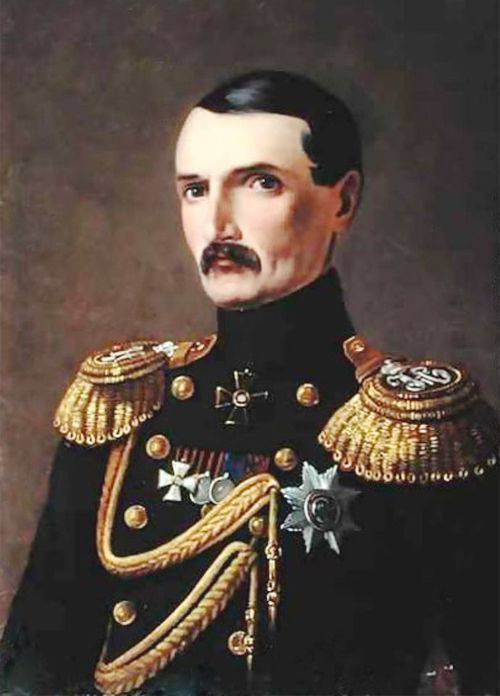
Portrait of Admiral V. A. Kornilov. A.F. Permyakov
At night, the defenders of the city did a great job of restoring the fortifications. To the amazement of the enemy, by the morning of October 6 (18), the Sevastopol fortifications were restored and ready for new battles. The allies understood that without a siege, Sevastopol was not to be taken, and they postponed the assault. The bombing of the city lasted a few more days, but without much success. Thanks to the tireless work of the talented Russian engineer Polzikov and Rear Admiral Istomin, who led the defense of Malakhov Kurgan, he was turned into a powerful strong point, until the end of the defense being the main link of the Sevastopol fortress.
Russian sailors in the defense of Sevastopol for the first time in the world used a number of new products in military affairs. For the first time in history, Russian sailors successfully used naval artillery to fire at invisible targets. This was achieved, firstly, by maximizing the elevation angles of the guns, which significantly increased the firing distance. Secondly, new methods of artillery fire adjustment were implemented, which ensured firing at invisible targets. Steamers successfully fired enemy positions, remote on 5 km from the Sevastopol raid. For the first time, Russian sailors began to blind steam-frigates, protecting them from enemy artillery fire. On the steamers, dugouts were organized, protecting the engine rooms and gunpowder cellars. For the first time in history diving works were carried out to seal the holes of steamers. Moreover, the correction of damage took place in combat conditions.
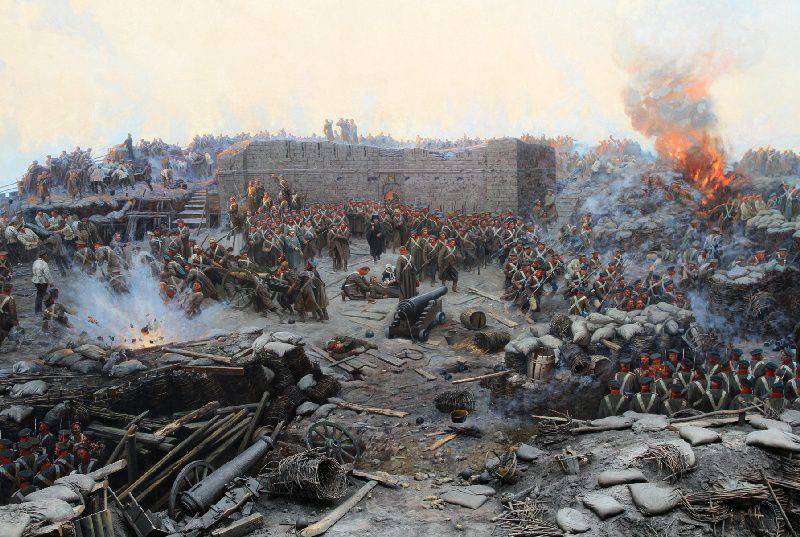
Defense of Sevastopol. Franz Rubo
The Allies systematically prepared for the assault on the city, moving closer to the line of its fortifications. Attempts by the Russian troops under the authority of Menshikov to loosen the siege - the Balaklava battle of 13 (25) in October 1854, the Inkerman battle of 5 in November 1854 and the assault of Evpatoria 5 in February did not lead to success. The defenders of Sevastopol themselves at that time achieved some success. In February, 17, the defenders of the Sevastopol fortress, captured important positions behind the Kilen-beam and built a number of important fortifications in the area - Volynsky, Selenginsky redoubts and Kamchatsky lunette. These fortifications have become a big problem for the Allies. They stormed them for several months. The seizure of these positions, advanced from the main defensive line for more than a kilometer, was of great importance for the active defense of Sevastopol. Having taken positions behind Kilen-beam, Russian troops created a threat to the right flank of the allied army. During an enemy shelling of the Kamchatka lunet 1855 in March 1855, Rear Admiral Vladimir Ivanovich Istomin, one of the most active and bravest participants in the organization of this amazing defense, was killed. “The defense of Sevastopol,” wrote P. S. Nakhimov, “has lost one of its main leaders in it.”
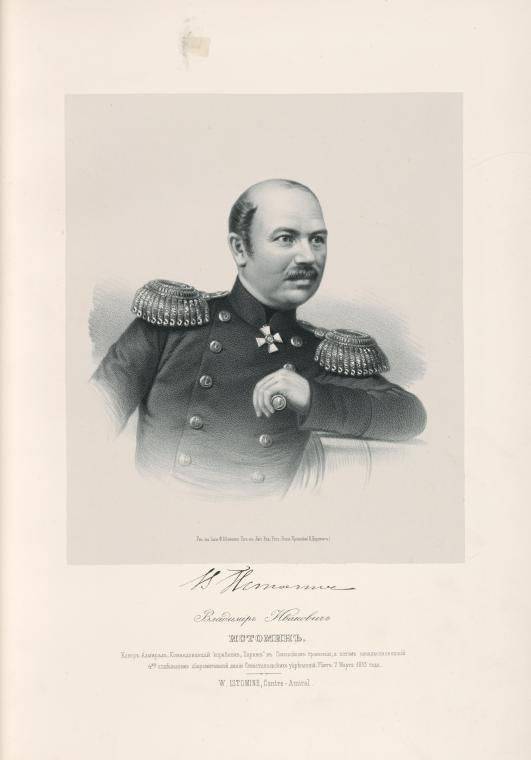
Rear Admiral of the Russian Fleet, Hero of the Sevastopol Defense Vladimir Ivanovich Istomin
Meanwhile, the siege continued, the Allies received new reinforcements, their army near Sevastopol increased to 120 thousand people. In January, 1855, on the side of the anti-Russian coalition, was Sardinia (Italian state). The Sardinian corps arrived in Crimea. 28 March (9 April) 1855, the Allies launched a second intensified bombardment, for which it was supposed to make an assault. For ten days allied artillery bombarded Russian positions, but the hellfire did not bring the expected result. The defenders corrected the damage at night and maintained high morale. The Allied Command postponed the assault again.
Western powers continued to build up the Crimean grouping of troops. The number of the allied army grew first to 170 thousand bayonets, and then 200 thousand people. The ruling circles of England and France, mobilizing enormous resources for waging war, demanded that the pressure on Sevastopol be increased. In the second half of May 1855, the Allied forces carried out the third general bombardment of Sevastopol, during which 100 thousand shells were fired around the city. Allied forces launched an assault on Russian positions in the Killen-Gul area. Against two Russian redoubts and one lunet a group was thrown into five divisions - up to 40 thousand bayonets. On the Volynsky and Selinginskom redoubts, Kamchatka lunette a fierce battle broke out. The enemy’s storming columns were met with grapeshot, then violent melee fights began to boil, in which, on average, one Russian soldier had 10-15 opponents. Careful preparation of the assault and a huge advantage in forces allowed the allies to break into the fortifications.
Encouraged by the seizure of the three Russian fortifications, the French commander-in-chief, General Pelisie, decided to build on the success and take Malakhov's mound. However, under the leadership of Admiral Nakhimov, the defender of Malakhov Kurgan met the enemy with powerful fire. Buckshot continuously beat on the French. The ship artillery of the Black Sea Fleet entered the battle. Strong artillery fire stopped the enemy. Russian troops, having received reinforcements, went to the counter. Sevastopol beat off the Kamchatka lunette, but soon, under the onslaught of two selected French divisions, they were forced to retreat.
Thus, during the assault on 26 in May of 1855, three advanced fortifications fell, but Malakhov Kurgan stopped the enemy offensive. The Allied command was forced to prepare a new powerful assault on Sevastopol, coinciding with it on the forty-year anniversary of the Battle of Waterloo. The command of the allied army decided to concentrate forces on a narrow sector: priority was given to Malakhov's kurgan and three bastions on the ship's side.
5 June 1855. Allied batteries began shelling the city. The enemy brought 587 guns into action, Sevastopol responded with 549 guns, but they had fewer shells and gunpowder. Prepared for a decisive attack, the British and French troops dressed in parade uniform. Counting on the suddenness of the strike, they attacked the city at dawn on 6 June. Against 18, thousands of defenders of the Ship side, a group of 45 thousand bayonets went on the offensive. At the forefront, a bloody hand-to-hand fight began. In the course were stones and axes. Some strong points changed hands several times. The Allied Command constantly brought new forces into battle, so the enemy avalanche did not weaken. The allies fought hard, but our warriors fought even more fiercely. As a result, the Allies were rejected. The French and the British lost more than 8 thousand people killed, wounded and captured. It was a major defeat for the Allied army.
After that, the Allies licked their wounds for two months and prepared for new battles; they did not undertake any assaults or new general bombardments. Rejecting a new decisive assault, the Allied army focused all its attention on the continuation of siege work. The allied command retained the old plan of attack - the concentration of forces in one direction. In June and July, the Allies aggressively advanced their positions to the fortifications of Sevastopol, firing a disturbing fire. During the day, the enemy moved an average of 3-4 meters towards Sevastopol. Two months after the unsuccessful assault, the Allied forces approached Malakhov Kurgan on 120 meters, and bastion No. 2 - on 100 meters.
New batteries were being built, most of which were directed against the Ship side of Sevastopol. The losses of the garrison of Sevastopol from enemy shelling increased. 8 (20) Jun Totleben was seriously injured. 28 June (10 July) fell brave Nakhimov.
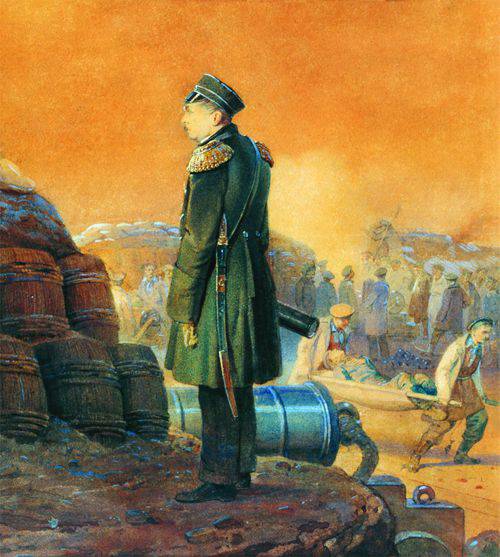
Admiral P. S. Nakhimov on the bastion. V.F. Timm
4 (16) August 1855. The Russian army under the command of Gorchakov was defeated on the Black River (The defeat of the Russian army on the Black River). The Allies decided that the time for a decisive assault had come. From 5 to 8 of August (17 — 20 of August) there was the fifth general bombardment of Sevastopol. The 800 fire of guns showered Sevastopol with a continuous hail of lead. The Russian garrison lost daily 900 — 1000 people. Later, from 9 to 24 of August (21 of August - 5 of September), the fire of enemy artillery was somewhat weaker, but, nevertheless, 500 — 700 people were knocked out every day by the garrison. 24 August (4 September) began 6-I intensified bombardment, which lasted until August 27 (8 September). By this time, the fortifications of Sevastopol were severely destroyed and no longer yielded to full restoration. Artillery Malakhov Kurgan and 2-th bastion was suppressed. Siege works were completed, the French were already in 25 meters from Malakhov Kurgan.
At noon on August 27 allied forces rushed to the assault. It took the French less than a minute to overcome the few meters that separated them from the Malakhov Kurgan. At the height of the French flag appeared. The Russian soldiers, pushed aside from the front edge at the first moment, rushed to the counterattack. A brutal hand-to-hand fight began, which lasted until the evening. Enemies had to take every meter of space with a fight. A small group of soldiers and sailors was blocked in the dilapidated tower of Malakhov Kurgan, barricaded themselves and resisted to the last. The French, fearing that there were large stocks of gunpowder in the tower, did not dare to set it on fire. Only after the Russian soldiers had run out of ammunition and they were almost all injured, they left the tower. There were only about 30 people, which caused a great surprise to the French, who believed that a large detachment was sitting in the tower.
In the evening, despite the heavy losses, the destruction of the fortifications and the lack of ammunition, the people of Sevastopol were ready to counterattack and beat off Malakhov Kurgan. But Gorchakov decided to leave the South side, as the garrison daily suffered huge losses. At this rate of fire, the allies could, without assault and open battle, completely destroy the Russian garrison for 15-20 days. Russian troops were relegated to the North side. All remaining fortifications were blown up, and the ships were drowned. The garrison was strengthened on the northern side of Sevastopol, where by this time strong fortifications had been created.
Thus ended the heroic defense of Sevastopol, which lasted 349 days. After the transfer of Russian troops to the North side, the Allied forces did not show a desire to resume fighting. The French commander-in-chief, Pélissier, declared that he "would rather retire than be involved in a maneuverable war." The Allies lost more than 128 thousand people (according to other data 250 thousand people). Russian losses were more than 100 thousand. People.
The defense of Sevastopol was of great importance. The defenders of the city thwarted the plans of England, France and Porta to transform Russia into a second-class country, fettered and bled the Allied army, inflicting huge losses in manpower and resources. Almost all of the major sea and land forces and resources of the Allied powers were shackled by Sevastopol. As a result, Russia was able to withdraw from the war with minimal territorial losses.
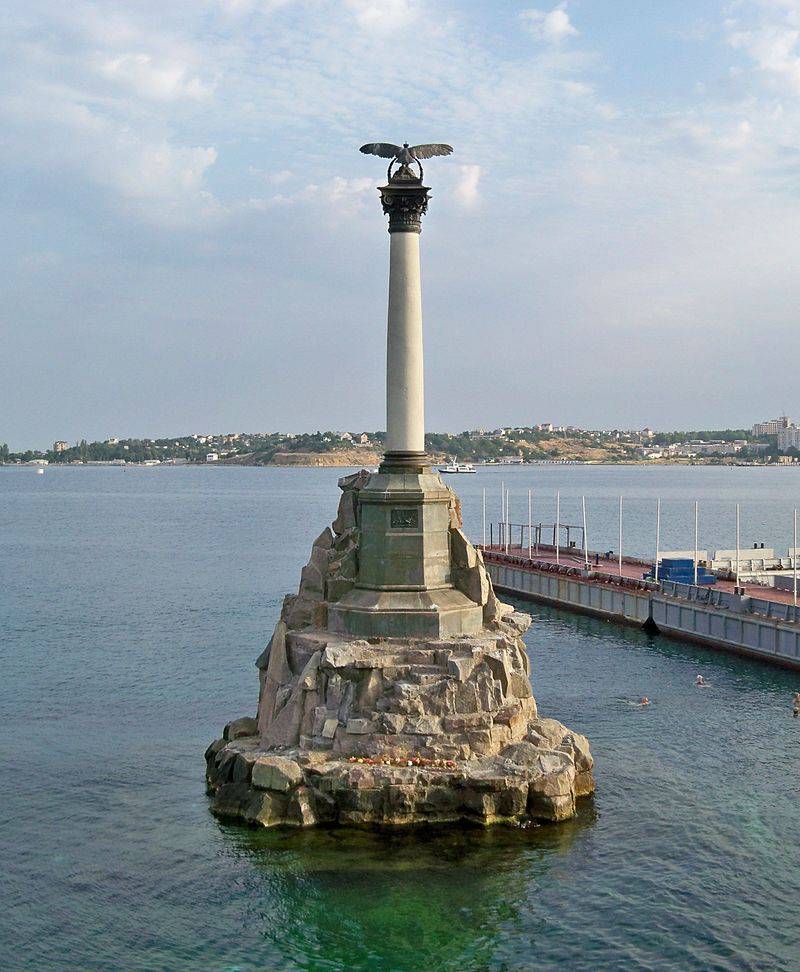
Sevastopol. Monument to the scuttled ships. Sculptor A. G. Adamson, architect V. A. Feldman and military engineer F. O. Enberg. 1905
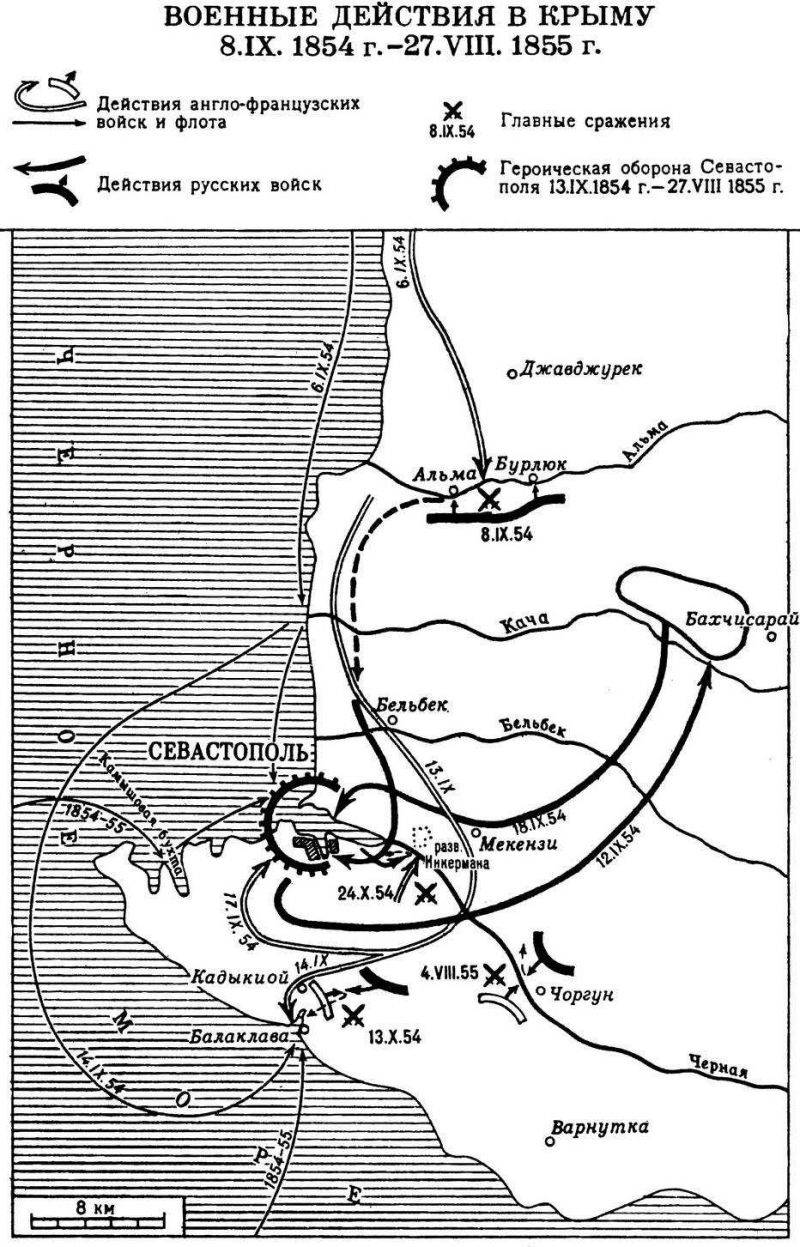
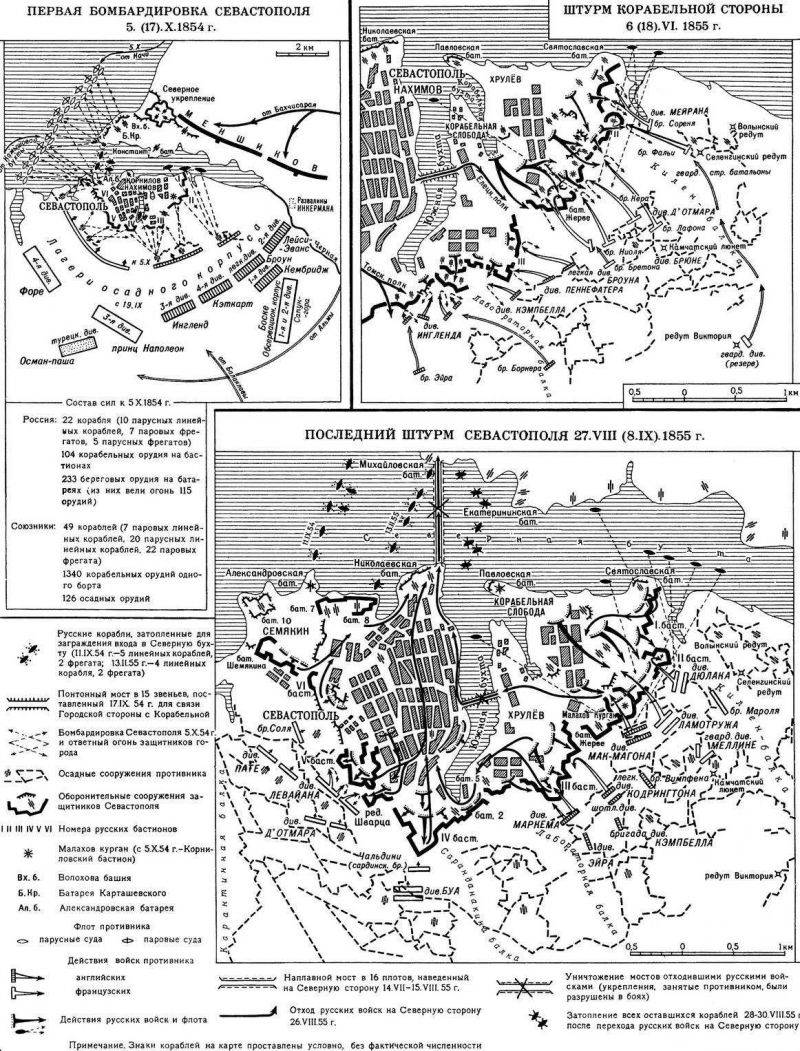
Information